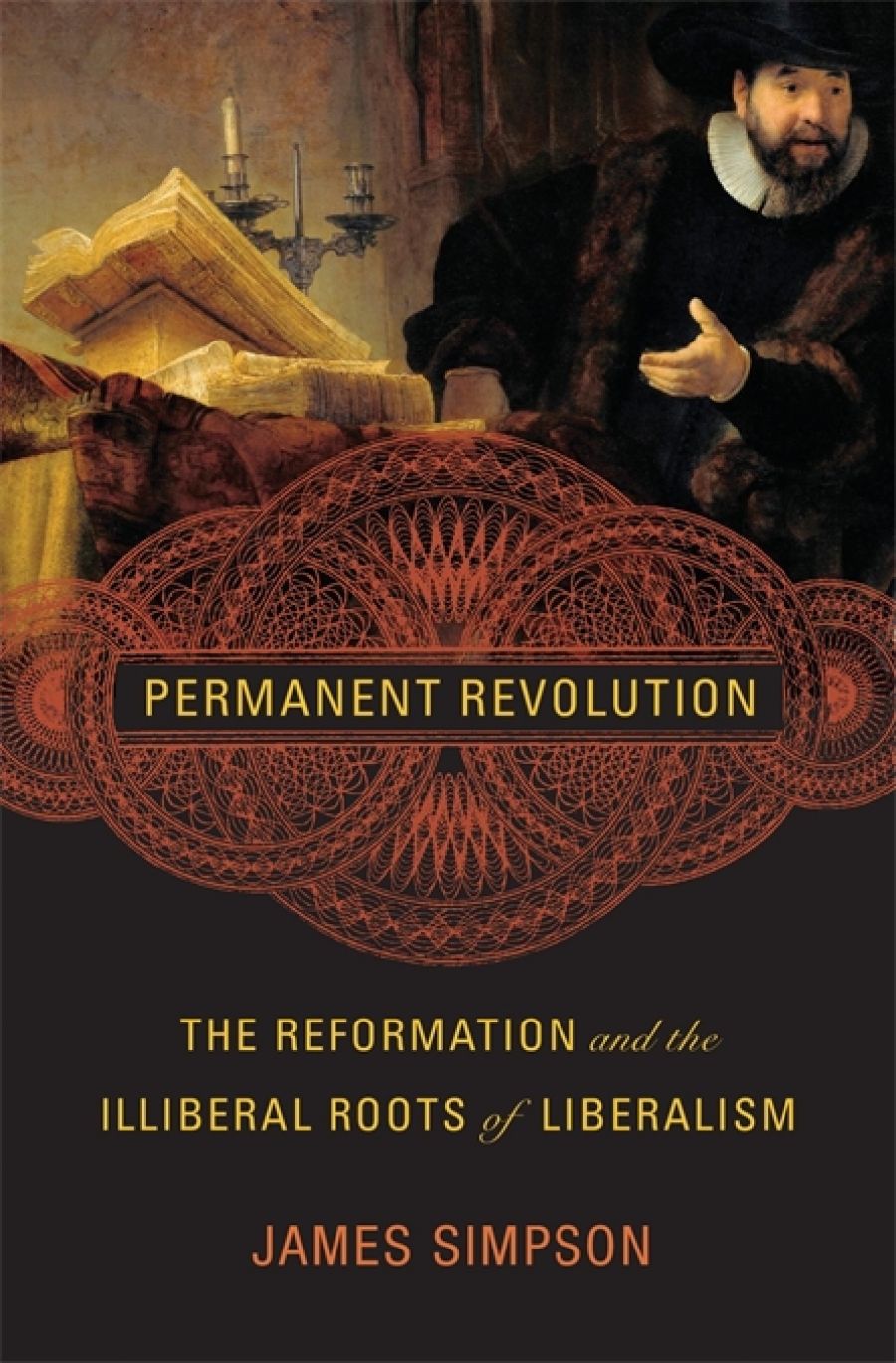
- Free Article: No
- Contents Category: Politics
- Custom Article Title: Paul Giles reviews <em>Permanent Revolution: The reformation and the illiberal roots of liberalism</em> by James Simpson
- Custom Highlight Text:
The argument of James Simpson’s Permanent Revolution is that the emergence of liberalism as a cultural and political category in the sixteenth and seventeenth centuries was shaped by the ‘radically illiberal history of ...
- Book 1 Title: Permanent Revolution
- Book 1 Subtitle: The reformation and the illiberal roots of liberalism
- Book 1 Biblio: Harvard University Press (Footprint), $79.99 hb, 464 pp, 9780674987135
One of the characteristics of Simpson’s work has always been to make connections between historical periods normally kept separate from one another, a form of synthesis he justifies on the grounds that smaller conceptual units tend to produce ‘truncated forms of historical understanding’. Simpson thus aims to ‘bring religious history into the story of modernity’, arguing that crossovers between medieval and Renaissance culture are as significant as those between the Reformation and the Enlightenment. There is a playful, donnish aspect to these historical reconstructions, with the author speculating that the late-fourteenth to mid-seventeenth century might productively be recast as ‘The Age of Biblical Literalism’. It was an ‘age’ in which the issue of despair came to enjoy increasing significance, outweighing more conventional humanist notions of tolerance and perfectibility, while the idea of hypocrisy also grew in stature and visibility. Though not considered important enough in medieval times to feature among the seven deadly sins, hypocrisy was given new status by the increasing emphasis on sincerity among Reformation thinkers, to such an extent that by the 1520s a charge of hypocrisy was being applied globally to the entire Catholic Church.
Simpson himself is a native Melburnian, and there is an interesting parallel between his work and that of political scientist J.G.A. Pocock, who worked in New Zealand before spending most of his career at Johns Hopkins University in the United States. In a reflective essay published recently, Pocock suggests how his own view of Anglo-American republicanism had been shaped in part by his ‘antipodean’ provenance, his refusal to become incarcerated intellectually within a particular geographic region. The mobility of Simpson’s perspectives carries a similar kind of charge. His traversal of historical time is similar in kind to Pocock’s traversal of national space, and it similarly serves to open up traditionally demarcated fields to more heterodox perspectives. There is a pointed critique throughout Permanent Revolution of many widely respected historians, with the author taking no prisoners as he chastises Christopher Hill’s ‘objectionable and plain ignorant views’, the ‘gross travesty’ involved in Keith Thomas’s misrepresentation of the medieval church, and the tendency of Jonathan Israel to advance ‘absurdly superficial positions in a number of books, some of them very long’. This is not only a historical work, but also a treatise about how history has been organised and written.
Simpson describes himself here as ‘more of a cultural historian than a literary critic’, and the bulk of this work focuses on how questions of theology intersect with issues in political history. But he also maintains that ‘works of art register cultural pressure and/or signal cultural change with greater, more luminous clarity than works from any other discursive field’, and this gives him licence as a scholar to consider various ‘exemplary’ texts familiar from the English literary canon, particularly those of ‘great literary authors’ such as Shakespeare, Spenser, Milton, and Bunyan. There is an illuminating discussion of how Shakespeare treats Puritan controversies obliquely, with the Duke’s description of Angelo in Measure for Measure as ‘precise’ being ‘an unmistakable buzzword for the puritan godly in early modern England’. Simpson also argues that Shylock in The Merchant of Venice is ‘less recognizable as a Jew and more recognizable as a Puritan’. He makes the cogent point that this kind of Elizabethan theatre cannot properly be understood unless positioned intertextually in relation to medieval cycles of plays. There are a number of very fine discussions of Milton, whose engagement with theology, politics, and aesthetics in equal measure furnishes an ideal critical space for Simpson’s account of how the idea of liberty developed. Simpson chronicles how Milton’s career was propelled by rejecting former versions of himself, and also how Milton’s attacks on fellow Protestants and former allies were driven by a paradoxical impetus of reforming the Reformation itself. Paradox, as the oxymoronic title of this book suggests, is a trope and theoretical matrix to which Simpson is particularly attuned.
Given his enthusiastic engagement with long theological treatises such as William Perkins’s A Golden Chain of 1591, Simpson does not seem quite as comfortable with creative writers of the more indolent kind. He is not so persuasive on Spenser, for example, expressing impatience with the ‘seriously overweight’ Faerie Queene and indicating, not entirely convincingly, that ‘The Faerie Queene is the original Gothic horror’.
As in many recent Harvard University Press books, there seems to be a deliberate and slightly forced attempt here to achieve a lightness of stylistic touch, but there is also a certain resistance to Spenser’s sense of aesthetic luxury and languor, with Simpson’s analytical rigour finding itself perhaps more obviously at home with Milton’s sterner injunctions. Nevertheless, this is an important and erudite book from a major scholar, one that takes issue in a critically self-conscious fashion with the way historical periods have been conventionally formulated, while arguing that we come to understand the cultural history of liberalism more clearly by recognising its continuities with the religious legacies of medieval culture.


Comments powered by CComment